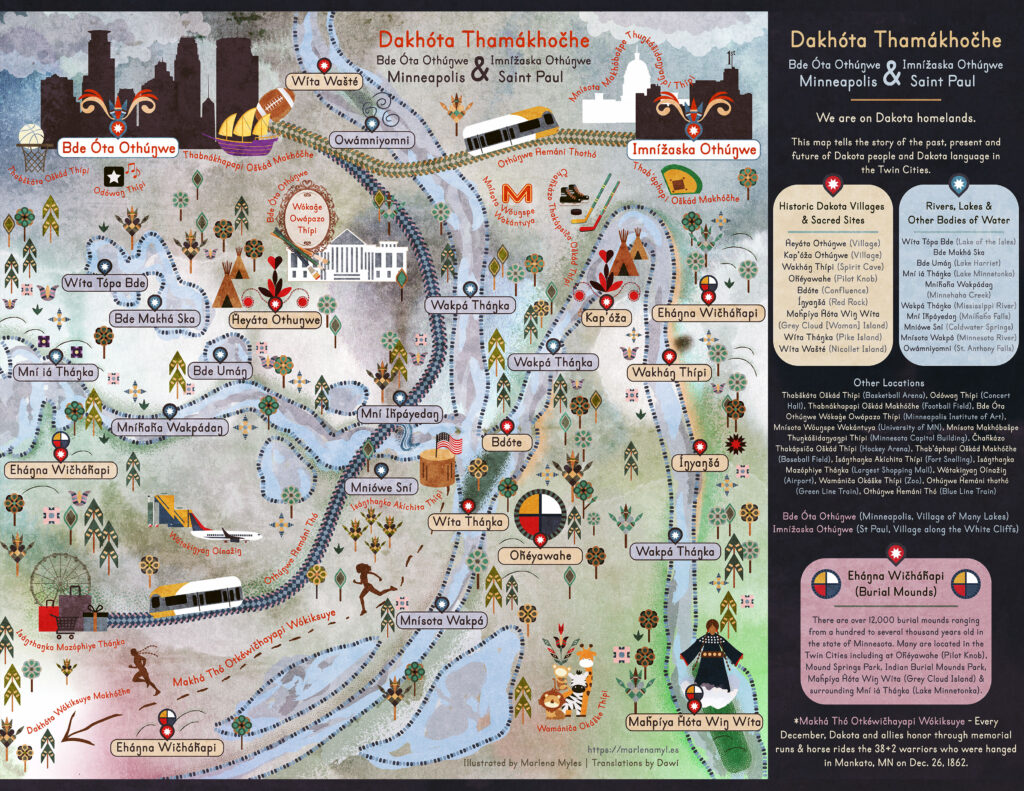Land Acknowledgment
Project Success and the Minneapolis Public Schools in which we serve reside on the ancestral homeland of the Dakota people. We acknowledge and celebrate the Dakota, as well as the Anishinaabe people, and the many other tribal nations that have lived and continue to live in Mni Sota Makoce (Minnesota) for countless generations. Project Success honors with gratitude the land we occupy and recognizes the importance of the historical context of broken treaties, forced migration and colonial policies and practices. We also acknowledge the Dakota people have historically been denied free access to their homeland, traditions, ceremonies, and sacred sites.

Dakhóta Thamákhočhe (Dakota land maps) By: Marlena Myles
We are committed to identifying practices rooted in colonialism that are still harmful to our Native communities today. And we strive to provide resources, support and programs that give access to our young Native scholars. Project Success celebrates Indigenous leaders in our schools, community and in our local and state government. We strive to build partnerships with our Native communities and will listen, learn and work continuously to bring culturally responsive programming to our students so that they may have the tools and confidence that will take them through the rest of their lives.
Additional Educational Resources
- Native Land Map – a community-powered resource that helps identify what Native land you are on
- Makoce Stories –Makoce Stories takes you around iconic Twin Cities’ locations and gives you a Native American perspective of the land that was before colonization. Hover over certain locations on their map and listen in on information that educates about the history and cultural significance of that respected site.
- All My Relations Podcast – a podcast centered around uplifting Indigenous conversations related to topics centered around relationships, community, and culture
- The On Being Podcast Resources – a host of resources dedicated to Native American culture and history in Minnesota, as well as on the practice of land acknowledgment
Twin Cities Indigenous Resources & Organizations
- MPS Indian Education – Minneapolis Public School district department whose purpose is to support and strengthen increased educational outcomes for American Indian students by promoting culturally responsive instruction, family and student engagement and partnerships with MPS departments, schools and the broader community.
- MIGIZI – MIGIZI provides a strong circle of support that nurtures the educational, social, economic and cultural development of American Indian youth.
- Minneapolis American Indian Center – A community center in the heart of the American Indian community of Minneapolis. It is one of the oldest Indian centers in the country, founded in 1975. MAIC provides educational and social services to more than 10,000 members of the community annually. They preserve and support American Indian cultural traditions through art, youth and inter-generational programs.
- Minnesota Indian Women’s Resource Center – The Minnesota Indian Women’s Resource Center (MIWRC) is a non-profit social and mental health services organization committed to traditional ways of being and support of Native women and their families.
- Sioux Chef – Committed to revitalizing Native American Cuisine and in the process re-identifying North American Cuisine and reclaiming an important culinary culture long buried and often inaccessible.


